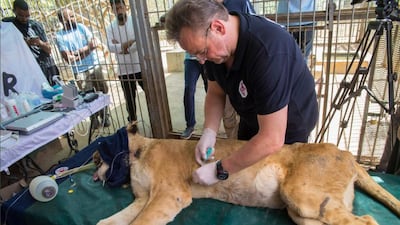Starving lions left neglected in a zoo in Sudan have been pulled back from the brink of death thanks to volunteer vets and a support group from Dubai.
The UAE office of the International Fund for Animal Welfare stepped in to help when the story of six starving lions and other animals at Al Qureshi private zoo in Khartoum attracted huge support online.
Representatives from IFAW in the UAE visited the country to work with the Sudan Wildlife Authority to improve conditions inside the zoo and help the sick animals.
They visited the country to support the ongoing work of vets from the Four Paws charity and young local volunteers.
Four Paws faced a desperate scene went first entering the park, but have worked tirelessly to nurse some of the animals back to health.
“When we did our initial assessment, the lions had lost almost two-thirds of their body weight,” said Dr Ali Khalil, the team leader in Sudan who co-ordinated the work inside the park.
“Two lions died before our arrival due to severe dehydration and malnutrition.
“A male lion Mansour, and female called Kandaka were particularly in a bad way.
“Both had signs of cataracts so their sight is not great. If the lion goes blind, they will need special care.”
Only two of the four surviving lions have names. Another two lions are in slightly better health.
They are thought to be about three years old, but should live to be 17-22 with the right care.
A Facebook campaign to move the lions was launched when photos of the lions with bones protruding from their skin were posted online.
Osman Salih launched Sudananimalrescue, and wrote: “I was shaken when I saw these lions at the park.
“I urge interested people and institutions to help them.”
A further two severely malnourished hyenas are also being rehabilitated, one is pregnant with three cubs.
Other survivors include two pythons, a number of fresh water turtles an African-spurred tortoise, two birds of prey and a monitor lizard.

“We were lucky to be able to interact with Kandaka as she was so weak we could not give her anaesthetic as she would have died,” said Dr Khalil, whose team has helped several rundown zoos in conflict areas of the region in recent years.
“Our team managed to catch her and get the fluids into her. She was eating and drinking that night.
“Lions are fighters and want to survive. She has continued to put on weight and is now able to stand and is much healthier.”
Although the zoo is operated by the local municipality, it relies on funding from private donors.
When IFAW officers arrived at the zoo in Khartoum to see how they could help, they found a lack of proper veterinary care and no vaccination programme or feeding schedule for the captive animals.
Many were surviving on carcasses and leftovers, while lions often went unfed for up to four days at a time.

IFAW has supported the Sudan Wildlife Authority by donating $5,000 (Dh18,000), paid in two instalments to a non-governmental establishment.
The foundation has also donated two laptops for the zoo, so it can maintain effective record keeping.
Meanwhile, Sudan Wildlife Authority has issued a list of procedures for management of the zoo, including the establishment of a proper feeding programme, improved hygienic measures and animal handling protocols.
“Countries struggling with unrest lack resources to provide the proper and needed care not only for the animals but also the people,” said Dr Elsayed Mohamed, IFAW’s regional director who visited Sudan.
“When IFAW stepped in to help these animals, we indirectly helped the staff who are taking care of these animals too.
"After 50 years of experience, IFAW learned to never take people out of the equation.
“To help animals, we need to help the people too”.
It is almost a year since the Four Paws organisation transported more than 40 animals, including lions and rare African monkeys, from Rafah Zoo in Gaza to a new home in Jordan.
The operation to transport 47 animals from the zoo, through Palestine and Israel to Jordan, where the government offered them shelter, was required after many animals became sick and malnourished during the siege of Gaza.
Read More
Sudan lions: outpouring of support for emaciated cats after viral campaign
Gaza's zoo animals are evacuated to Jordan
Plea to UAE to find new homes for baboons rescued from war zone zoo in Gaza Strip
Four Paws is now planning for a similar operation, should the government allow the movement of the sick animals out of Sudan.
There are currently six volunteer vets working at the Al Qureshi zoo to supervise correct feeding and healthcare checks are being done.
The charity is also training others in the correct techniques to look after the surviving animals.
“We want the very sick lions to be taken out of this zoo, and placed into one of our sanctuaries in either Jordan or South Africa,” said Dr Khalil.
“A perfect solution would be to move the lions to the Lionsrock sanctuary in Bethlehem, South Africa.
“There is also a centre in Holland that can offer the specialist treatment that Kandaka may need if her sight deteriorates.
“We have lost two lions, we don’t want to lose any more.”


